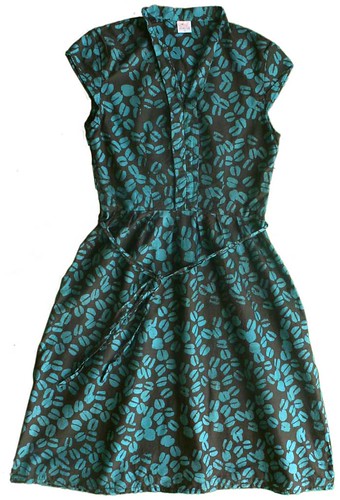
Global Mamas employees pose for a picture during batiking.
Since entering into the world of fashion studies, I have longed to combine my love for dress with another passion of mine - community outreach. If academic fashion fails me in the end, my backup plan is to establish sustainable, responsible fashion production centers around the world.
Time Magazine predicts that "green" technology and various related occupations will pull the world out of this economic rut. But of course, not everyone has the background or capital to start a non-profit from the ground up. That's okay - this is the perfect time to begin supporting fair-trade fashion organizations. Part of contributing to a green economy is by purchasing its products. It is only until people start buying sustainable and fair-trade fashion that it'll make an impact on the entire industry (aka it will get cheaper).
To create awareness, I'm going to produce a series of posts dedicated to various geographical regions hosting fair-trade or sustainable fashion and textile production centers. In light of a recent grant I proposed, I'm going to start with Africa.
Global Mamas

Interns accepted? Yes
Can you visit? Yes. They have workshops in Ghana, including a retail store in Cape Coast. Many fair-trade shops in America host their products.
Global Mamas is a subdivision of the Ghanaian non-profit organization, Women in Progress. Founded by Peace Corps volunteers Renea Adam and Kristin Johnson in 2002, Global Mamas has provided opportunities for women to increase their personal revenue and create localized, woman-owned businesses across Africa. Adams and Johnson believe that “helping women gain economic independence is the most effective way to reduce dependence on foreign aid and steadily create a prosperous society.”
All Global Mamas products are created by Ghanaian residents in workshops across the country. Traditional methods such as batik, bead making, weaving and soap production are used to create clothing, home goods, jewelry and bath items which are then shipped to fair-trade distributors in Europe and America. (Click to expand post)
SUNO

Interns accepted? Unknown.
Can you visit? Generally, yes. Send an inquiry to Max and he can let you know.
The success of SUNO is proof that fashion, sustainability, responsibility and fair-trade can work together to create competitive products in a global fashion economy. Max Osterweis, an American designer and film maker, created SUNO after realizing that the textiles he collected on various trips to Kenya could be used to create marketable clothing in the Western fashion industry. Osterweis took into account the political and economic situation in Kenya when he began his company, employing locals at workshops in Nairobi and Nakuru. SUNO allows employees to not only showcase their talents and artistry, but provides them with a chance to rebuild themselves financially after recent political unrest decreased capital from foreign tourism.
SUNO also utilizes locality on the domestic front as well. All design concepts are conceived in New York City's garment district, where patterns and sample pieces are drawn up and sent back to Kenya for their final construction. NYC's garment district has seen a revival in recent years, with many designers returning back to the area's warehouses to produce clothing and accessories, instead of outsourcing. Osterweis connects charity and couture, spreading awareness of fair-trade practices through his high-end designs.
Amana

Interns accepted? Unknown.
Can you visit? Unknown. Their collection can be purchased online or in stores in the UK.
Amana's initial philosophy is "to make beautiful clothes with ethical origins and to illustrate that environmentally and socially responsible fashion can equate to exquisite design and quality." Launching their first collection in 2007, London designers Helen Wood and Erin Tabrar employ the services of women from a village called Ain Leuh in the mountains of Morocco to manufacture their designs. They source materials such as organic cottons and silks, and work with companies in the United Kingdom to produce low-impact dyes for their gorgeous collections.
The word "Amana" is Arabic for "delivered in trust," a trust that can be upheld through the company's choice of eco-friendly materials and methods of production. They even provide a list of their credentials on their website, to prove their legitimacy and commitment to responsible fashion. They also offer their products at competitive prices, acknowledging the fact that sustainable fashion can only do its job if it is available to the masses, not a privileged few.
Please check out these companies, and the role they play in supporting fair-trade practices within the fashion industry. If there are some other companies working in Africa that you know about, please pass them along! I'd love to take a look at them and possibly work with them in the future.

No comments:
Post a Comment